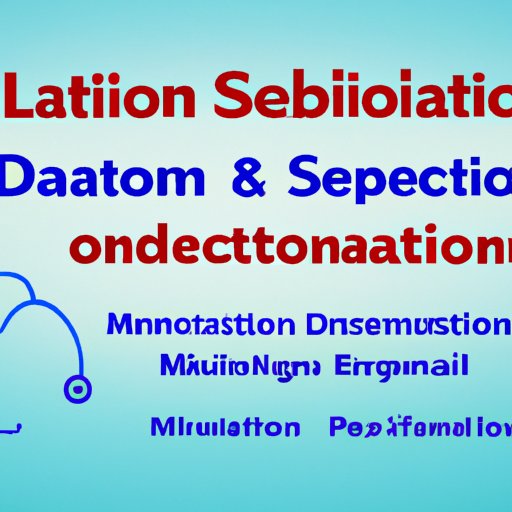Introduction
A medical science liaison (MSL) is a professional who bridges the gap between scientific experts and healthcare providers. They are the bridge between the medical, clinical, and research communities. MSLs provide healthcare professionals with up-to-date scientific information on new treatments and therapies, as well as advice on how to best use them. Becoming an MSL requires certain qualifications, education, and training.

Research the Role of Medical Science Liaison
The first step to becoming an MSL is to understand what the job entails. Research the duties and responsibilities of the role, such as providing scientific support to healthcare professionals, conducting educational programs, and developing relationships with key opinion leaders. This will help you determine if the job is right for you, as well as give you an idea of the qualifications you’ll need to meet.

Understand the Qualifications Required to Become a Medical Science Liaison
In order to be successful in this role, you must have a strong understanding of the medical sciences, including anatomy, physiology, pharmacology, and pathology. You should also have a good understanding of clinical research and clinical trial processes. In addition to these qualifications, there are other requirements to become an MSL.
Educational Requirements
Most employers require MSLs to have at least a bachelor’s degree in a relevant field, such as biology, chemistry, or biochemistry. Some may also require a master’s degree in a related field. An advanced degree may be beneficial for those wanting to pursue a career as an MSL, as it can demonstrate your knowledge and expertise in the field.
Clinical Research Experience
Having clinical research experience is essential for success as an MSL. Employers typically prefer candidates who have prior experience in clinical research, such as working in a clinical research organization or as a research assistant. Having direct experience in the field allows you to better understand the needs of healthcare professionals and the challenges they face.
Pursue Education and Training in the Field
In addition to meeting the educational and experience requirements, it is important to stay up-to-date on the latest developments in the medical sciences. There are several ways to do this, including taking courses and pursuing professional certifications.
Degree Programs
There are many universities that offer degree programs in medical sciences, such as a Master of Science in Medical Sciences or a Doctor of Philosophy in Medical Sciences. These degrees can help you gain the knowledge and skills needed to become an MSL.
Professional Certifications
There are also professional certifications available for MSLs, such as the Certified Medical Science Liaison (CMSL). This certification demonstrates a high level of expertise in the field and is highly sought after by employers.
Acquire Clinical Research Experience
In addition to pursuing education and training in the field, it is important to gain clinical research experience. There are several ways to do this, such as internships, volunteering, and shadowing experienced MSLs.
Internships
Internships are an excellent way to gain hands-on experience in the field. Many universities offer internship opportunities with local healthcare organizations, which can provide valuable insight into the job. Additionally, some employers may offer paid internships, which can be a great way to earn money while gaining experience.
Volunteering
Volunteering is another great way to gain clinical research experience. Many hospitals and research centers offer volunteer opportunities, which can provide valuable experience in the field. Additionally, volunteering can help you build relationships with potential employers.
Develop Expertise in Specific Therapeutic Areas
It is important for MSLs to have a deep understanding of their therapeutic area. To do this, it is important to take advantage of continuing education opportunities and attend industry conferences. These will help you stay up-to-date on the latest developments in your field and can help you build relationships with other professionals in the field.

Network with Professionals in the Field
Networking is an important part of any job search, and it is especially important for MSLs. Social media platforms such as LinkedIn can be a great way to connect with other professionals in the field. Additionally, joining professional organizations such as the American Association of Medical Science Liaisons can help you stay informed and connected with other MSLs.
Apply for Open Positions
Once you have gained the necessary qualifications, education, and training, it is time to start applying for open positions. Use appropriate resources such as job boards and recruitment websites to find open positions. When applying for jobs, make sure to include all relevant qualifications and experience. Additionally, prepare for interviews by researching the company and practicing your answers to common questions.
Conclusion
Becoming a medical science liaison is an exciting and rewarding career path. It requires certain qualifications, education, and training, as well as clinical research experience and expertise in specific therapeutic areas. Additionally, networking with other professionals in the field and applying for open positions can help you land the job of your dreams. With the right qualifications and dedication, you can become a successful MSL.
(Note: Is this article not meeting your expectations? Do you have knowledge or insights to share? Unlock new opportunities and expand your reach by joining our authors team. Click Registration to join us and share your expertise with our readers.)
